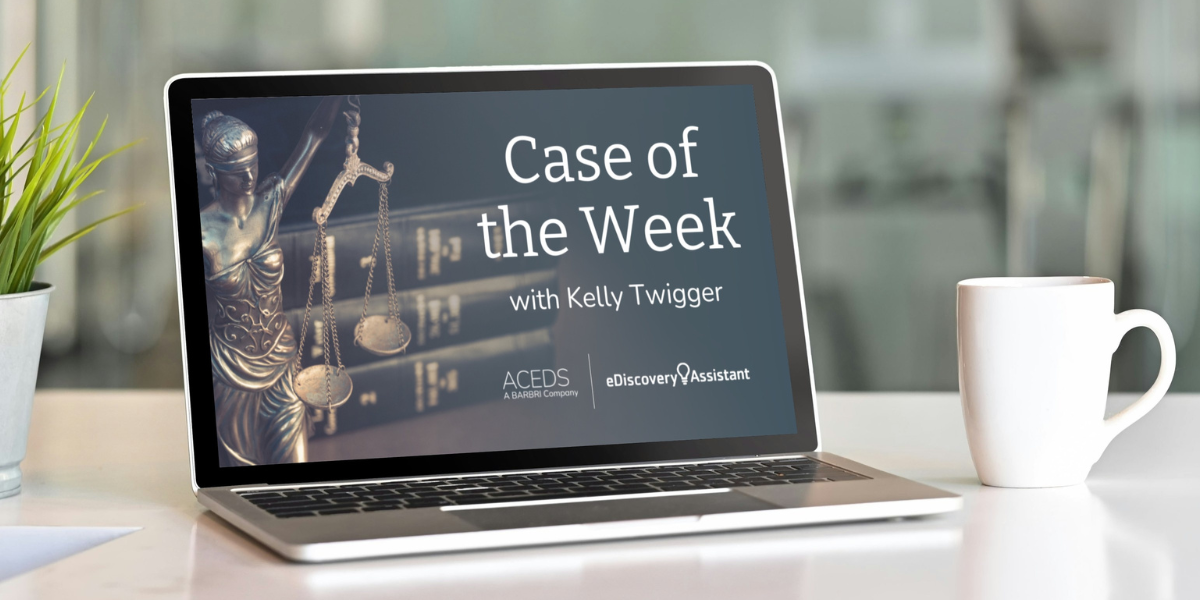In the complex world of eDiscovery, the responsibilities of in-house counsel are more critical than ever. The stakes are high, and the consequences of missteps can be severe, as highlighted in this week’s Case of the Week. In this blog, we’ll examine the recent decision in Domus BWW Funding, LLC v. Arch Insurance Company, where a series of eDiscovery failures led to costly and potentially case altering sanctions. This case serves as a cautionary tale for in-house counsel, offering vital lessons on the importance of early preservation, diligent supervision, and honest communication with the Court.
Case Background
The case of Domus BWW Funding, LLC v. Arch Insurance Company was decided on August 12, 2024, by U.S. District Judge Joshua Wolson. This decision, one of 13 in our eDiscovery Assistant database written by Judge Wolson, underscores the importance of proper eDiscovery practices. The issues at hand included cooperation of counsel, spoliation, sanctions, failure to preserve, and failure to produce evidence—an unfortunate confluence of missteps that culminated in a roadmap of what in-house counsel should avoid.
Key Facts of the Case
Domus sought insurance coverage from Arch for defense costs related to an underlying civil matter. The journey to the Court’s decision began in July 2018 when Domus first notified Arch of its claim. Lynne Miller, Arch’s claims adjuster, and Greg McGowan, the policy underwriter, were central figures in this case.
Arch denied coverage multiple times between 2019 and 2021, leading Domus to file a lawsuit in September 2022. Despite the ongoing litigation, Arch delayed issuing a litigation hold until October 2022—four years after learning of the claim. This delay set the stage for the eDiscovery pitfalls that followed.
Both Miller and McGowan identified relevant electronic and hard copy documents. However, McGowan left the company shortly after the litigation hold was issued, and critical ESI (electronically stored information) was mishandled. By June 2023, Arch had only produced 100 documents, all from the claims file, despite agreeing with Domus on search terms for ESI.
In-house counsel, Don Layden, failed to follow up with the paralegal tasked with executing the ESI search, leading to a significant oversight. Moreover, Arch underwent a data migration in the summer of 2023, during which McGowan’s preserved emails were mistakenly deleted. By the time Arch realized this mistake, the backup tapes had been overwritten, resulting in the permanent loss of these emails.
Despite knowing about the missed ESI search, Layden did not inform outside counsel until October 2023, by which time over 12,000 documents had been identified. Layden’s failure to communicate these issues compounded the problems, leading to further delays and sanctions.
Court’s Analysis and Ruling
Judge Wolson’s analysis was clear and direct. He criticized Arch’s handling of the ESI search, describing the delay as indicative of “counsel’s disdain” for its discovery obligations. The Court found Arch’s behavior, and particularly Layden’s lack of diligence, to be “somewhere between dismissive and disingenuous.”
The Court highlighted the significant delays and the resulting loss of McGowan’s emails as a breach of Arch’s discovery obligations. While the Court did not find intentional misconduct sufficient to warrant sanctions under Rule 37(e)(2), it did find that Arch’s actions caused prejudice, justifying sanctions under Rule 37(e)(1). The Court allowed Domus to introduce evidence of Arch’s eDiscovery failures and stated that it would craft an appropriate jury instruction at trial.
In an ironic twist, Arch’s earlier claims that certain hard copy documents did not exist were proven false when a last-minute search revealed eight file folders containing 400 pages of relevant documents, including the very handwritten notes that Arch had denied existed.
Key Takeaways for In-House Counsel
This case offers several crucial lessons for in-house counsel involved in eDiscovery:
- Early Preservation and Diligence: The importance of issuing a litigation hold promptly cannot be overstated. Arch’s four-year delay in issuing a hold was a significant misstep that contributed to the loss of critical ESI and hard copy documents.
- Active Supervision: In-house counsel must actively supervise the eDiscovery process. Delegating tasks to paralegals or other staff members without follow-up can lead to serious oversights, as evidenced by Arch’s failure to execute the agreed-upon ESI search.
- Transparent Communication: Transparency with outside counsel and the Court is essential. Layden’s failure to inform outside counsel about the ESI issues until it was too late exacerbated the situation and led to further complications.
- Honesty is Non-Negotiable: Misrepresenting facts to the Court, whether intentionally or due to negligence, is a grave mistake. Arch’s initial claims about the non-existence of certain documents were later proven false, damaging their credibility and leading to sanctions.
- Seek Court Intervention When Necessary: If eDiscovery issues arise, it is crucial to involve the Court early on. Domus’s decision to press forward without seeking timely Court intervention may have limited their ability to mitigate the prejudice caused by Arch’s failures.
Conclusion
The Domus v. Arch case serves as a stark reminder of the importance of vigilance, honesty, and proactive management in eDiscovery. In-house counsel play a pivotal role in ensuring that their organization meets its discovery obligations, and the consequences of failing to do so can be severe. By learning from Arch’s mistakes, in-house counsel can better navigate the complexities of eDiscovery, protect their clients’ interests, and avoid the pitfalls that lead to costly sanctions.
This case should be a wake-up call for all legal professionals to prioritize eDiscovery processes and uphold the highest standards of legal practice.


